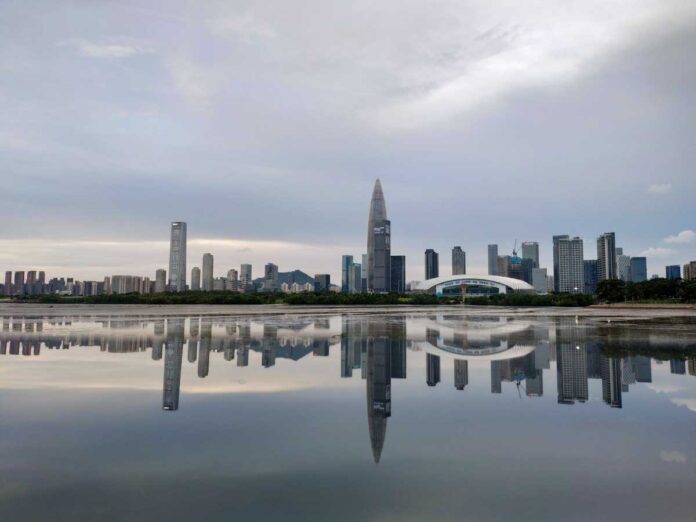There are some kinds of development I have observed in Guangdong in its both overall and subdivided areas, here, we can find that the Guangdong Bay Area includes two special administrative regions (Hong Kong and Macau), as well as nine cities in Guangdong Province. They are: (Guangzhou, Shenzhen, Zhuhai, Foshan, Huizhou, Dongguan, Zhongshan, Jiangmen, and Zhaoqing).
The ruling Communist Party and the Chinese political leadership, represented by President “Xi Jinping” attach great importance and great expectations to building the (Guangdong-Hong Kong-Macao Greater Bay Area), and Guangdong Province is working to build the Greater Bay Area as an important opportunity to advance a new beginning of reform and opening up in the province. It aims to achieve comprehensive, high-level openness by building this region.
The local government in Hong Kong is focusing on (five aspects of development work), namely are:
improving the business environment, accelerating the construction of the Greater Bay Area International Scientific and Technological Innovation Center, building the region into a strong support for the construction of the “Belt and Road”, and enhancing infrastructure connectivity and connectivity, creating a high-quality living environment suitable for living, working and traveling. Here, the Guangdong-Hong Kong-Macao Greater Bay Area is a distinct identity card for the Chinese development model
Within the framework of cooperation between cities included in the Greater Bay Area, these cities have provided facilities for young people and entrepreneurs in (Hong Kong and Macau) in areas such as entrepreneurship, employment, education, and medical care. Cultural exchanges in the Greater Gulf region have become more active since the implementation of the reform and opening-up policy about 40 years ago.
The (Guangdong-Hong Kong-Macao Greater Bay Area) is under the supervision of the Chinese government to make it a center for innovation and industrial modernization internally and globally. The Guangdong Province Integration Project works to connect Hong Kong and Macau to 11 cities located on mainland China, including (Guangzhou and Shenzhen), to better integrate (Hong Kong and Macau) into the country’s global development, while providing an opportunity for mainland China to raise the level of external openness. By exploiting the advantages of Hong Kong and Macau, in order to create the “great project” of opening up to the outside in the new era under the supervision of the Chinese Presidential Comrade “Xi Jinping”.
The (Hong Kong-Zhuhai-Macau Bridge) and high-speed railway lines between (Guangzhou, Shenzhen and Hong Kong) have been put into operation, reducing the distance between Hong Kong and Macau from more than three hours to just half an hour. As for riding the high-speed railway from (Guangzhou to Hong Kong), It only takes 47 minutes
The Guangdong-Hong Kong-Macao Greater Bay Area has unique advantages. This is not only because the degree of openness of the area is already high, what is more important is that the project has always received strong support from the central Chinese government. Recently, Chinese President “Xi Jinping” asked Guangdong Province to adhere to the pioneering spirit and create more experiences based on its own advantages.
The construction of the (Guangdong-Hong Kong-Macao Greater Bay Area) will not only further integrate (Hong Kong and Macao) with the mainland of China, the Chinese authorities are pushing the economic development of the Pearl River delta region to a new level, as it seeks to be a (global base for innovation-driven development).
According to the (Global Innovation Index) issued by the World Intellectual Property Organization, the innovation cluster index for the cities of (Shenzhen and Hong Kong ranks second), after the Tokyo Bay area. The initial shape of the (Greater Bay Area of Guangdong) is now home to a host of innovative companies, and its future potential may exceed our imagination.
In my eyes, there are ma6 aspects of Guangdong’s high-quality development, and its development level internationally, whereas the Innovation-driven development is a driving force for the development of Guangdong Province. According to my knowledge, research and development expenditures in the Guangdong province exceeded 250 billion yuan. Guangdong Province ranks first in terms of comprehensive regional innovation capacity, and companies with strong innovation capabilities, such as the companies of (Huawei and Tencent), are growing there.
The ruling Communist Party and President “Xi Jinping”, through the local government of Guangdong Province, pay great attention to intellectual property rights, and the (Intellectual Property Rights Court) has been established.
At the same time, Guangdong Province paid attention to (constructing a scientific and technological innovation platform), promoted the construction of a number of major scientific facilities and key national laboratories, established the (Fundamental and Applied Research Fund Committee), and promoted research in nine major areas. It also works to provide a suitable environment for talent development.
In Guangdong Province, there are hundreds of thousands of the (high-tech enterprises) operating at the national level. Building a modern economic system is a key part of high-quality development, and emerging and future strategic sectors must be developed.
The local government at Guangdong works to provide a suitable environment to support the development of institutions. In recent years, the province has issued a series of policies and measures to support the real economy, support the development of private enterprises and promote foreign trade, as well as measures to support employment.
The development of the Greater Bay Area of Guangdong has been praised not only as a new attempt to break new ground in seeking opening-up on all fronts in the new era for the Chinese, but also as another step in moving forward towards practicing the “one state, two systems” principle.
The Guangdong Bay Area development plan adopted by the ruling Communist Party covers the beginning of the period from 2022 in the short term and extends to 2035 in the long term.
The development plan for the Guangdong Bay Area includes about (11 items and sectors), namely: development and innovation, comprehensive requirements for high-quality development, spatial planning, developing an international center for innovation and technology, accelerating the pace of infrastructure connectivity, building a modern global competitive industrial system, and supporting the preservation of environment, developing a good life cycle for living, working and traveling, enhancing cooperation and participation in the “Belt and Road” initiative, and jointly developing cooperation platforms at (Guangdong – Hong Kong – Macao) in implementing the plan.
In your opinion, there are many benefits that Guangdong’s high-quality development can bring to the world, besides some other important reflections and opportunities to China. We find that, in comparison with (the New York Bay Area and the San Francisco Bay Area in the United States of America and the famous Tokyo Bay Area in Japan), the region of the (Guangdong Bay – Hong Kong – Macao Bay) province is considered a new type of open economy globally, which the Chinese government represented in the ruling Communist Party and President “Xi Jinping”, seek to create and serve as a unique modern experience in the world, by achieving high-level development and quality so that the Guangdong Bay Area becomes a first-class international country in the world. Therefore, the Chinese authorities paid attention to creativity and innovation under the framework of “one state, two systems, 3 customs regions, and 3 Currencies and 3 Legal Systems”, to pave a new development road with Chinese characteristics in the (Guangdong- Greater Bay Area).
The Greater Bay Area of Guangdong Province is the central government’s vision in Beijing for the interconnected Pearl River Delta region in southern China. Here, Hong Kong, Macau and 9 other cities in Gongdong Province will be linked to form an integrated international economic and trade center. The Greater Bay Area in China will become the fourth of its kind in the world, after those in San Francisco and New York in the United States of America and Tokyo in Japan.
More than 60 million people live in the Greater Bay Area of Guangdong. This will be the largest number among all Gulf regions in the world. Guangdong emphasizes the pattern of industrial modernization and innovation globally, compared to other large Gulf regions in the world, and the Greater Gulf region in China is considered the only region that still emphasizes industrial development around the world and internally. This means they will have more innovation. We find that Hong Kong, as an international city, can contribute greatly to China’s regional development around the world.
Guangdong and the Greater Bay Area have also worked to improve the business climate and promote financial innovation to serve China’s real economy with the world. In addition to the interest of (the Greater Guangdong-Hong Kong-Macau Bay Area) in experimenting with (innovation for the pattern of regional economic development on an international level), as well as as a window for the international community in revealing how the Chinese experience has succeeded in promoting innovation to promote high-quality development.
For this reason, China has worked to ensure the implementation of the “one state, two systems” policy, mutual respect in the social system and the legal system, and coordinate and manage the differences between the tax and legal systems in the region and at the international level, by settling problems through the market system and its methods and adhering to the focus on the people and coexistence among the people and the general consensus.
The Chinese government and its ruling Communist Party are currently working to transform the Guangdong Bay Area into a vibrant world-class urban agglomeration, a global international center for innovation and technology, an important pillar of support for the Belt and Road Initiative, a showcase for in-depth cooperation between the mainland, Hong Kong and Macau, and a good life circle for living and working and travel).
Therefore, the Chinese government is making great efforts to build on the four main cities of (Hong Kong, Macao, Guangzhou and Shenzhen), as they are essential engines for regional development in the new era for China, while continuing to benefit from their comparative advantages in striving towards excellence and high-quality development achievements, while enhancing its extended influence in terms of driving the development of nearby areas.
About Author: Dr. Nadia Helmy, Associate Professor of Political Science, Faculty of Politics and Economics / Beni Suef University- Egypt. An Expert in Chinese Politics, Sino-Israeli relationships, and Asian affairs- Visiting Senior Researcher at the Centre for Middle Eastern Studies (CMES)/ Lund University, Sweden- Director of the South and East Asia Studies Unit.






